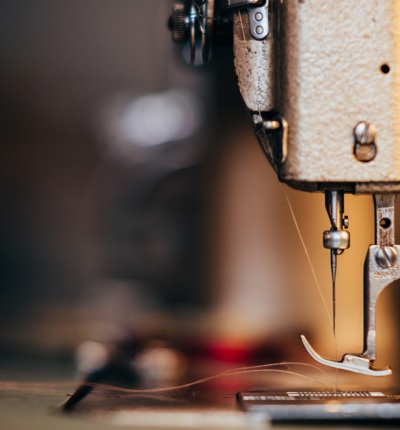
Sewing seeds for change in the global fashion industry amid the COVID-19 pandemic
Lydia O'Connor-Butler and Oliver Holland discuss how the COVID-19 pandemic has exposed poor practice impacting workers at the bottom of global fashion supply chains and what is being done to address it.
Posted on 19 June 2020
The COVID-19 pandemic has disrupted many features of our daily lives and as the infectious disease has spread across Europe, consumer spending has changed drastically in response to increased financial insecurity.
For many, keeping up with the latest fashion trends has become less of a priority and there has been a shift towards making more deliberate and conscientious choices.
Meanwhile, in the garment industry, the financial burden of the pandemic is impacting the most vulnerable people at the bottom of its supply chains, as billions of dollars’ worth of orders have been paused or cancelled, with multi-nationals invoking the force majeure provision for undelivered goods to free both them and their suppliers from their contractual obligations.
In light of recent events, many fashion brands have pledged their allegiance to the ‘Black Lives Matter’ movement, and yet at the same time are implementing harmful measures that compromise the basic dignity for many people of colour across the world who stitch together the latest trends on the European high streets.
Women, in particular, are affected by this as they make up approximately 80 per cent of readymade garment (RMG) workers.
The legacy of European imperialism is woven into the fabric of the garment industry, which engenders a race to the bottom to provide cheap clothes and source increasing cheaper labour.
As labour rights are compromised in this context, RMG workers face increased risks of exploitative behaviour as we have seen in the COVID crisis.
Complex supply chains are a distinguishing feature of the garment industry, as well as a heavy reliance on labour based in low-income countries where human rights abuses, child labour, industrial accidents and harmful environmental practices are common.
To facilitate consumer demand for low-priced clothing, RMG workers often suffer most due to the imbalance of power between suppliers and global buyers.
The impact of the pandemic in Bangladesh has given rise to the emergence of a “new poor” class as a study of people in urban slums and rural areas reveals a more than 70 per cent drop in income for people living in poverty.
Sofie Ovaa, global campaign co-ordinator of Stop Child Labour, says: “There are many girls in countries like India and Bangladesh who are willing to work for very low prices and are easily brought into these industries under false promises of earning decent wages”.
It is estimated that 1.2 million children in Bangladesh are trapped in the worst forms of child labour, including modern-day slavery, forced labour and bonded work.
The COVID-19 crisis exposes children to an increased risk of exploitation, abuse and contracting the virus itself, as prolonged disruption is likely to result in reduced wages which may require longer working hours.
In addition, children in Bangladesh are increasingly vulnerable to being drawn into child labour as the lack of wages reduces the abilities of parents and carers to pay school fees and government measures to limit the spread of the virus have resulted in ongoing school closures.
On 13 May, 2020, Dr Jafar Uddin, Bangladesh’s Commerce Secretary, addressed a formal letter to the European Parliament in which he called out the “unbearable and uncompassionate action by some European apparel business”, highlighting it as a direct contrast to the EU’s efforts in relation to ethical trade.
Dr Uddin called for the EU to take a stand for the many women and their dependants who are being most gravely impacted by the $3.18 billion worth of cancelled or suspended orders.
On 2 June, 2020, the European Union pledged to donate €113 million to support RMG workers who have become unemployed and lost income due to the impacts of the pandemic.
This financial support will be available from July to September and may be extended until December. The EU fund does not include aid for any legal action to be taken against the multi-national corporations.
While the injection of financial support will hopefully provide some relief for many RMG workers in Bangladesh, this initiative points to the need for long-term sustainable solutions in this area.
The issue of cancelled payments isn’t exclusive to Bangladesh; brands cancelling on suppliers during the coronavirus pandemic is a global crisis, and is prevalent in many countries including India, Haiti, Sri Lanka, and Cambodia.
EU Previous Action
The measures at EU level to address the garment industry’s harmful practices are currently quite limited.
In April 2017, the European Parliament asked the European Commission to strengthen its existing approach and table a legislative proposal in order to end ongoing human rights abuses throughout supply chain management in the garment sector.
The European Parliament concluded that voluntary initiatives led by the private sector over the past 20 years, such as codes of conduct, self-assessments and social audits, had not proven to be effective in bringing about a real strengthening of workers’ rights, especially in terms of respect for human rights and gender equality. It was proposed that a potential EU legal framework should include measures to address remedies for victims and strengthen supply chain transparency and traceability.
The European Commission and European Council have so far been reluctant to adopt binding legislation on due diligence for EU based companies and have instead continued to advocate for the voluntary approach .
The European Commission also cited the Non-Financial Reporting Directive 2014/95/EU (NFRD), adopted in 2014 and transposed into law in 2018, as being potentially relevant in this area as it requires large public interest companies to report on non-financial matters, including their principal risks and due diligence processes.
The NFRD primarily focuses on environmental issues such as greenhouse gases and emissions and fails to address the social issues of RMG workers.
EU Proposed Action
There is renewed hope that the EU will set a stronger agenda in holding companies accountable for their actions.
On 28 April, the European Commissioner for Justice, Didier Reynders, pledged support for binding rules that will require companies to conduct human rights due diligence in their global supply chains. Reynders stated that the EU needs “real and mandatory regulations” that govern “human rights, social issues, and environmental issues,” and the Commission is now set to commence public consultations on the matter.
The COVID-19 crisis has been a chilling reminder that the garment industry’s business models are simply not able to protect the fundamental rights of the many millions of RMG workers around the world.
If the EU is to impose legal responsibilities on companies for rights abuses in their global supply chains, this could have a meaningful impact.
The UK’s position must also be considered as falling outside of any new potential EU legislation should not absolve the UK from also taking steps to further strengthen corporate accountability.


